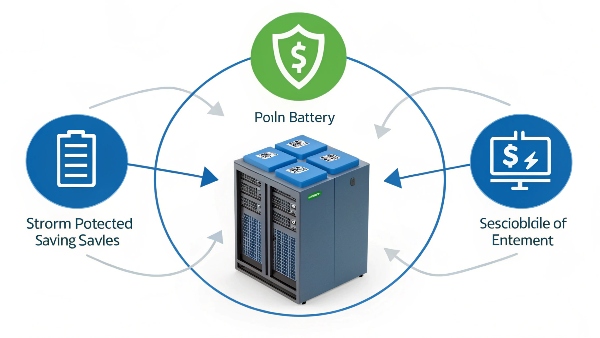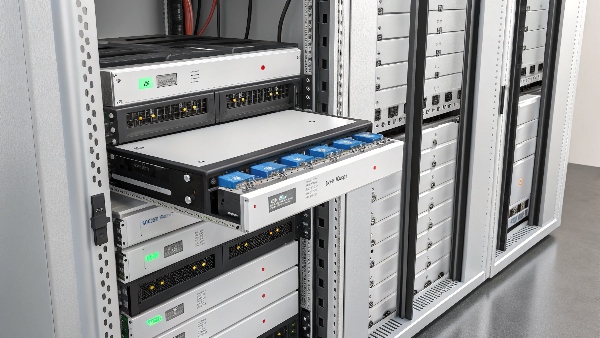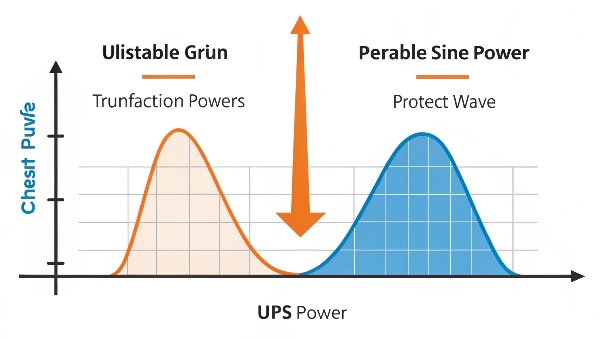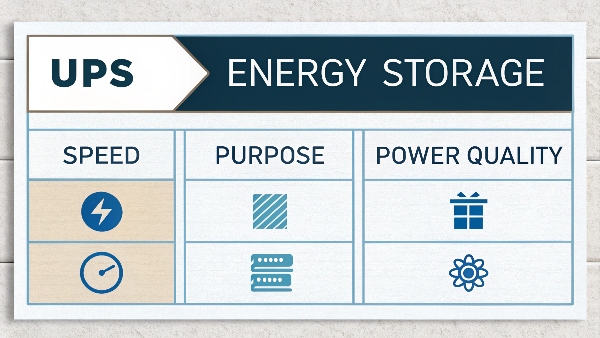You see a UPS as just a costly insurance policy for blackouts. You are missing a key function that could also save you money on your daily electricity bills.
Yes, a UPS does more than just provide backup power. While its main job is instant protection, a UPS is fundamentally an energy storage device. A modern UPS system can be used for energy management strategies like peak shaving to lower costs.

Transition Paragraph:
In my 10 years at Daopulse, I've seen this technology evolve firsthand. A key insight I share with our OEM/ODM partners is that a UPS system can also be used for energy storage. This changes the entire conversation. It's no longer just about surviving a power outage. It's about using stored energy intelligently to benefit your bottom line. This simple fact transforms how a procurement manager or system integrator should view the role and value of a modern power protection system.
What role does the energy storage device play in a UPS system?
You see the main UPS unit, but the battery seems like a simple, separate box. This makes it easy to underestimate its importance, leading to insufficient protection when you need it most.
The energy storage device, which is the battery, is the heart of the UPS. It provides the actual power during an outage. Its capacity determines the runtime—how long your critical equipment stays online.

Dive deeper Paragraph:
The battery is the fuel tank of your UPS. The UPS unit itself is the engine, managing the power, but without fuel, the engine is useless. The amount of energy this "tank" can hold is measured in Amp-hours (Ah) or Watt-hours (Wh). A larger tank means a longer runtime. As a manufacturer, we design systems with two main types of battery technology: traditional lead-acid and modern lithium-ion. Lead-acid batteries are a proven, cost-effective solution, perfect for standard applications where budget is a key concern. Lithium batteries, a specialty of ours backed by patented technology, offer more. They are lighter, have a much longer lifespan, and can handle more charge-discharge cycles. This durability is what allows them to be used for more than just emergency backup. It unlocks their potential for daily energy storage functions. For a client like a hospital, we engineer the system to ensure life-support has enough runtime. For a data center, we ensure servers can shut down gracefully. The battery choice is central to that design.
What is the main purpose of a UPS?
You think a UPS is just to keep the lights on during a blackout. But this narrow view ignores the daily power problems that are silently damaging your sensitive, expensive electronics.
The main purpose of a UPS is to provide a continuous supply of clean, high-quality, and truly uninterruptible power. It protects equipment not just from blackouts, but from sags, surges, and electrical noise.

Dive deeper Paragraph:
The most important letter in "UPS" is the "U" for uninterruptible. Many power problems are not complete blackouts. They are micro-second-long disturbances, voltage sags (brownouts), or spikes (surges). These events won't turn off your lights, but they will stress and degrade the delicate internal components of servers, medical equipment, and networking gear. A true UPS, especially a Line-interactive or Online model, acts as a permanent shield. A Line-interactive UPS constantly corrects under- and over-voltage conditions without even using the battery. An Online Double-conversion UPS, the gold standard for critical applications, completely rebuilds the power from the battery up. This means your equipment is 100% isolated from the chaotic grid. Its only power source is the perfect, stable signal created by the UPS. For a System Integrator, providing a client with a certified Online UPS is a guarantee of performance. It eliminates power quality1 as a source of mysterious hardware failures and reboots. The main purpose is total power peace of mind.
What is the main role of an energy storage system?
You hear "energy storage" and immediately think of massive batteries for the power grid or a Tesla Powerwall. This makes the concept seem too big and disconnected from your immediate business needs.
The main role of a general energy storage system is to capture energy and save it for later. It's often used to store cheap off-peak electricity or excess solar power for use during expensive peak hours.

Dive deeper Paragraph:
The primary role of a general energy storage system, often called a BESS (Battery Energy Storage System), is economic. It's a financial tool as much as an electrical one. The basic idea is "buy low, sell high" with electricity. The system's control software monitors energy prices or solar panel output. It charges the batteries when energy is cheap (middle of the night) or free (sunny afternoon). It then discharges that stored energy to power the building when electricity from the grid is most expensive (late afternoon peak demand). This strategy is called "load shifting" or "peak shaving." It directly reduces a company's utility bill. For large industrial users, a huge portion of their bill can come from "demand charges," which are based on their highest single spike of energy use. An energy storage system can discharge its battery to "shave" that peak, resulting in massive savings. Its main role is strategic energy management over long periods, from hours to entire days.
What is the difference between a UPS and energy storage?
They both use batteries, so they must be basically the same, right? This common assumption can lead to costly mistakes, like using the wrong tool for a critical job and leaving your business exposed.
The primary difference is their mission. A UPS has a protection mission: to provide instant, high-quality power. A general energy storage system has an economic mission: to shift energy use over time to save money.

Dive deeper Paragraph:
While both systems use batteries, they are engineered for different missions, which changes everything. A UPS is a high-speed sprinter; a BESS is a long-distance marathon runner.
UPS vs. BESS: Mission-Driven Differences
| Feature | Uninterruptible Power Supply (UPS) | General Energy Storage System (BESS) |
|---|---|---|
| Primary Mission | Protection: Instant, clean power | Economics: Shift energy over time |
| Response Speed | Milliseconds (Instant) | Seconds to Minutes (Slow) |
| Discharge Duration | Minutes to a few hours | Hours to Days |
| Key Technology | Power quality (inverter, filter) | Battery capacity & smart controls |
However, here is the crucial insight: the lines are blurring. With the rise of high-performance lithium batteries, a modern UPS can now perform both roles. It can be your sprinter and your marathon runner. We are now designing UPS systems for our clients with software that allows for peak shaving. The UPS still performs its primary mission of protection, but during normal operation, it can be programmed to discharge a small amount of power to offset a building's energy peaks. This means the UPS, once just an insurance policy, now actively helps pay for itself by lowering your electricity bill every single month.
Conclusion
A UPS is essential for instant, clean power protection. But today, a modern UPS system can also serve as a smart energy storage device, providing daily cost savings on top of its critical protective role.
-
Learn how power quality impacts hardware performance and why it's essential for system reliability and longevity. ↩

